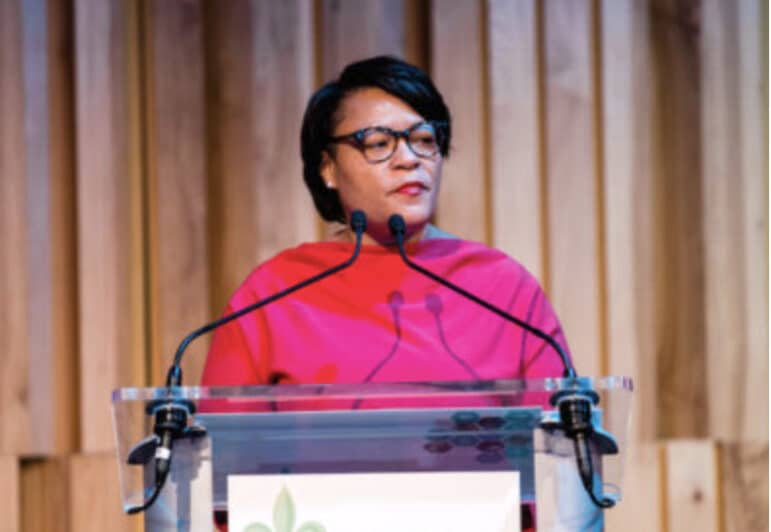
Justen Williams, 343 Media
Mayor LaToya Cantrell
By Danae Columbus, opinion columnist
Two like-minded bills that together will fundamentally redefine the recall process for Louisiana elected officials are working their way through the 2023 legislative session in Baton Rouge. Though the new laws, if ultimately approved, will bring Louisiana’s rules in closer alignment with other states, a political action committee associated with Mayor LaToya Cantrell is raising its voice in protest and soliciting funds to fight back.
An email sent Tuesday (May 9) to supporters by Cantrell’s long-time campaign manager Maggie Carroll labels one of the pieces of legislation, House Bill 212, as “voter suppression.” Carroll further asks for assistance in gathering $250,000 for the Cantrell-supported Action New Orleans PAC.
In an interview, Cantrell said she knows nothing about the recall legislation and doesn’t care whether it passes. She also distanced herself from Carroll’s comments and current fundraising efforts. Carroll confirmed that Cantrell was not behind the PAC’s latest activities.
Action New Orleans has served as a fundraising and communications tool for the Cantrell administration since the mayor was first elected. It also encourages citizens to cast votes in favor of Cantrell-endorsed candidates and frequently posted Cantrell’s anti-recall comments.
Introduced by state Rep. Paul Hollis, R-Covington, who has pioneered previous recall legislation, HB 212 seeks to change the way the number of signatures needed to force a recall election are determined. Current law sets that figure based on a percentage of registered voters. The proposed law relies on a percentage of the voters who participated in the election that put the targeted public official in office.
If the public official ran unopposed, election officers will search back until a comparable election is found and use that number as a basis for calculation. HB 212 would also change when the recall petitioners are notified of the number of signatures needed and the current confusing process regarding the submission of petitions.
Under Hollis’ legislation, in races where fewer than 1,000 electors voted in the most recent contest to elect the public official to office, the petition shall be signed by the same number of electors who voted in the contest. If 1,000 or more electors voted in the most recent contest electing the public official to office, the petition shall be signed by at least 1,000 electors or 30% of the number of people who voted in the election, whichever is greater. Other sections of the legislation deals with the role of the Secretary of State.
The companion bill, SB 123 by state Sen. Cameron Henry, R-Metairie, delves into all the important details of the recall process. It addresses many more of the technical aspects that would make the law easier to understand for the recall petitioners, the registrar of voters, and the Secretary of State.
In the recent recall campaign, proponents had difficulty and endured numerous delays in getting the basic information needed to move through the process. Both bills are only aimed at getting a petition approved for a recall election. Voters will still have the opportunity to determine whether the elected official should be recalled.

Danae Columbus, Uptown Messenger
Volunteers help unload boxes of recall petitions outside City Hall on Feb. 22.
Henry’s legislation has been approved by the Senate and is awaiting a hearing in the House and Government Affairs Committee. After the addition of important amendments, that same committee approved Hollis’ HB 212 by a vote of 9 to 3 on April 25. The committee includes nine Republicans and three Democrats, all of whom voted along party lines. Henry’s legislation could be approved by a similar majority.
A minor amendment to HB 212 was approved on the floor of the House earlier this week. The bill was returned to the calendar until May 17 in order for a fiscal note to be prepared. Perhaps the request for a fiscal note was a way for opponents to slow down the legislation. One unsuccessful floor amendment by state Rep. Barry Ivey, R-Baton Rouge, would have allowed recall petitions to be signed electronically.
Unless the fiscal note is horrific, supporters of HB 212 and SB 123 expect approval of both pieces of legislation. If Democratic legislators oppose the bills vehemently enough, Gov. John Bel Edwards could consider a veto for one or both. Henry worked closely with registrars of voters statewide to craft his legislation.
Since Cantrell cannot control the legislative process, she has no choice but to attempt a workaround to kill the proposed changes to the recall process. Her fundraising appeal focuses on elections — like on March 25 — when turnout did not exceed 10%. In those elections, PAC director Carroll claims, the signatures of only 3% of voters would be required to recall that official.
Yet, in elections like Cantrell’s 2021 race for mayor, the signatures of 30% of the 75,325 electors who cast their votes, approximately 22,600 people, would be needed. That calculation would have assured the success of the Cantrell recall campaign. After about 40,000 signatures were tossed out, the petition contained more than 27,000 valid signatures.
Though Carroll characterizes the proposed changes as “a radical departure from longstanding law,” Rep. Hollis testified the proposed law would mirror current laws in Michigan and other states where recall elections are frequently held.
Carroll also explained to potential donors that the funds raised would be used to directly support Cantrell’s current lawsuit against Secretary of State Kyle Ardoin, who reduced the number of active Orleans Parish registered voters only for purposes of the Cantrell recall effort. Cantrell’s lawyers filed the litigation several months back but never moved the suit forward.
Federal law requires Ardoin and the parish registrar of voters to review the voting rolls annually in search of individuals who no longer meet voting requirements. The current laws governing the removal of voters from the rolls requires multiple steps and contains safeguards. Funds would also be used for voter registration, voter education and grassroots organizing.
“Voter suppression will not be tolerated in Louisiana,” wrote Carroll. Nor should it. Neither of these two bills make any attempts to reduce the number of electors or to move voters from active to inactive. They do shine a light on how often citizens fail to exercise the franchise and what that means during a recall. The next Secretary of State (Ardoin is not seeking re-election) will probably be more vigilant in updating the voting rolls. Citizens who wish to remain on the active voter list will have to take personal responsibility for better communicating changes of address in a timely fashion.
Young and ethnic voters are the future. If Cantrell is really interested in building a stronger, more multi-cultural voter base, she will lead by example and create a campaign in churches, educational institutions, neighborhoods and with the cultural community to increase the number of active voters. Cantrell won re-election not because she was beloved but because her opponents were too weak individually and collectively. The recall process should never be taken lightly.
Then again, elected officials should always do their jobs so that citizens aren’t motivated to recall them.

Danae Columbus, opinion columnist
Danae Columbus, who has had a 30-year career in politics and public relations, offers her opinions on Thursdays. Her career includes stints at City Hall, the Dock Board and the Orleans Parish School Board and former clients such as former District Attorney Leon Cannizzaro, former City Councilman Jared Brossett, City Councilwoman at-large Helena Moreno, Foster Campbell, former Lt. Gov. Jay Dardenne, former Sheriff Charles Foti and former City Councilwomen Stacy Head and Cynthia Hedge-Morrell. She is a member of the Democratic Parish Executive Committee. Columbus can be reached at swampednola@gmail.com.
It is one thing to have an opinion, yet a complete statement of facts also do matter. Mayor Cantrell won her December 2021 election against 13 challengers in the first primary with over sixty percent of the vote. Any other candidate garnering that kind of support or greater wouldn’t be characterized as not being beloved. Another fact is despite having mailed directly every eligible voter in Orleans Parish recall petitions to sign and funded with non-stop TV, radio and social media advertising, the recall campaign failed to persuade most New Orleans voters. And having failed to even garner a recall with a lowered voter threshold this spring, proponents (especially Republican ones) again are seeking to lower the goal posts — underscoring the singular hatred Mayor Cantrell has endured from a distinct minority of zealots apart from all other mayors of New Orleans in our 300+ years of history.